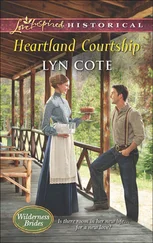By the time I was done reminiscing, McCabe had devoured all of her food and was eyeing mine. I told her she could take as much as she wanted, because I was not hungry. She ate nine chicken wings, a pound of potato salad, and half a strawberry-rhubarb pie, licking her fingers between each course, and then dozed off. I had never seen McCabe asleep. Old McCabe’s pink, fat self had repulsed me so thoroughly that I usually focused on her left earlobe when politeness forced me to look at her. I always kept a good deal of physical space between us. This new McCabe did not make me gag reflexively. There was a peculiar serenity about her, as if a plump blood sausage had been emptied out, the skin tightened and scraped with an abrasive substance, and then filled with an odorless, colorless essence. Her serenity allowed me to examine her now, with an entomologist’s cold precision.
She was wearing old jeans tucked inside half boots, and a man’s red plaid jacket over a brown turtleneck. It was the first time I had seen her not encased in leather. Her breasts had shrunk to the size of grapefruits. The freckles on her face were smaller and less close to each other, or maybe bigger and so close to each other that they gave her a new complexion, ivory replacing ruddy and blotchy. Perhaps it was just an optical illusion, now that her face was less round and the skin pulled back over her bones.
Since her reappearance, she had eaten twice as much without gaining an ounce. Heaping plates of steamed potatoes and pig knuckles, tureens of tripe and oxtail soups, goat stews, mounds of fat sausages of all colors and origins—among which I could identify only the boudin blanc from having seen its picture in a magazine (not being a sausage lover myself)—scrambled eggs with calf brains, and a variety of stewed animal entrails all began appearing on the dinner table from the first day McCabe returned, as if Petrona again had received instructions behind my back. There were now two distinct dinners served: mine, faithful to the master menu of the month I had given Petrona; and McCabe’s, increasingly visceral and gargantuan. Only good wines were served now—the ones I kept under lock and key—different ones every day, cannily chosen. Every day, I checked my key and the wine cellar lock, still spying on Petrona, hoping to catch her stealing my wine or ordering the meats that McCabe now ate, which were delivered daily and in vast quantities.
Petrona was her usual hieratic self. She was the only one in the household who had not changed: surrounded by unexplained phenomena, I acquired for a while a nervous twitch on the left corner of my mouth that made me look as if I were smiling even when distressed. On arrival, Petrona always greeted me with a Buenos días, señora in her obsequious pre-Columbian lilt, quickly glancing at the tip of my nose, never my eyes, and then lowering her eyes back to half-mast, which is where she kept them when she was around me (in her own home I was sure that she was a straight-gazed, unblinking John P. Wayne). Her departure was identical, gesture for gesture, the only difference being a subtly textured Buenas noches, señora , evoking each night a different shade of contempt. In between, on the rare occasions on which I spoke to her, she stuck to her meretricious script with Noh-theatre discipline. Petrona behaved as if she were immortal, connected every minute to all the Petronas that had existed before her and would exist ever after. I felt vertigo one day looking at Petrona’s impassible face, which suddenly became the face of millions. Was that what Mrs. Wilkerson felt when she looked at my mother’s own guarded face? Spying on Petrona yielded only one curious fact: she liked to eat sugar cubes. I never found out how any of the household’s new food and wine transactions were accomplished, and I dared not ask. After all, everything in this house—the food, the wine, even Petrona—belonged to McCabe. I was a guest.
I removed McCabe’s boots and socks so I could examine her feet. She stirred but did not wake up. Her feet, which had seemed elongated, were in fact still beefy and pink, and covered with freckles. So were her hands. They were the only parts of her body that had not changed, as far as I could tell (I had never seen McCabe naked or even at the beach). Hands and feet now looked incongruous, a graft performed by a surgeon devoid of aesthetic sense. She opened her eyes just as I finished putting back on her socks and boots. That night I replayed this scene in my room. Hadn’t she opened her eyes just a beat before I had withdrawn my hands from her left foot, like an actor stepping on another actor’s cue, a microscopic step that neither the audience nor the other actor can see, but both can sense, or at least suspect?
Killing a pig is easy. Pigs are like fat babies. Hot-blooded, squirmy, squealing, sly, and utterly useless unless you like their meat. Feeding them both to sharks, as the sublime Montevidean advised two centuries ago, would have raised humanity a tiny bit closer to the angels. It’s physically harder to kill a pig or a gargantuan baby than to twist the neck of a goose, but it’s morally easier. Cuteness will not stop you if, like me, you do not confuse sentimentality with morality. You will put on your butcher’s apron and get to work.
McCabe used to be an easy kill. Not anymore. She was now closer to a bird than a mammal, except for her wolf-like appetite. She was still gaunt despite the prodigious amounts of meat she ate, but a thin, steely layer of muscle and tendons now covered her bones. You wouldn’t notice it unless you touched her, as I had while she slept under the willow tree. It was now mid-October. The cool air had chased away the gnats and the mosquitoes. Dust had vanished from the streets of Elmira, resplendent in the lingering Indian summer. The townspeople had begun wearing bright red jackets and hats, so that hunters would not mistake them for deer.
After her passionate account of the migrating birds, McCabe had become silent and elusive again. Not unfriendly, though. She smiled at me the few times we crossed paths in the garden, a tentative, embarrassed little smile. She seemed to spend her days pacing the property line, deliberately, like a prospector counting her footsteps, with her eyes always fixed on the ground. I did not have an uninterrupted view of her journey, even with the Judge’s binoculars. McCabe would disappear behind a copse and reappear an hour or two later half a mile to the left. She could have gone to town and back. Yet I was sure that she hadn’t. It was a deduction grounded on an objective fact. I observed that every day McCabe would begin her walk at one cardinal point and that every two hours on the dot she would appear at the next. The entry point and the walk itself would proceed clockwise for four days, and counterclockwise for another four. Someone sneaking to town wouldn’t trap herself in such ironclad routine.
The re-education and killing scenarios I had imagined for her predecessor did not quite fit this peculiar automaton either physically, logistically, or, worst of all, morally. Justification and execution procedure alike had to be retooled. I resented the bony creature for making me redo my homework, and tried to whip up resentment into murderous motivation, but that was too ridiculous, even for me. I began to take long baths before going to bed, seeking illumination in the water. Watching the hypnotic filling of the tub, I wondered if it would be painless to take sleeping pills and drown.
In that state of mind, I stood one day at dusk on the edge of the Judge’s property, overlooking the river one hundred feet below. I stood there every day to watch the sun set beyond Shangri-La. I do not care for sunsets, but I liked staring at Shangri-La, which at that hour looked like a bunch of tea leaves at the bottom of a dirty teacup. I had a feeling someone was watching me. When I turned around, McCabe was there. I had not heard her approach, even though the ground was already thick with crunchy red and yellow leaves.
Читать дальше












